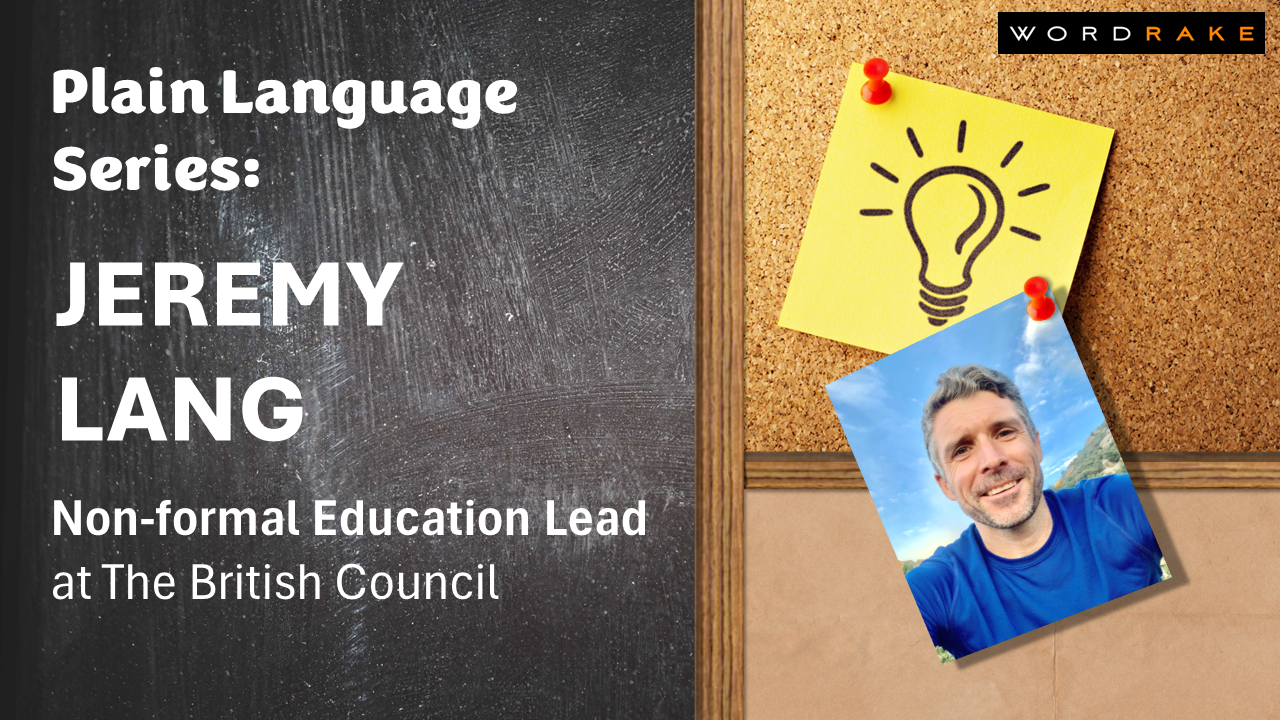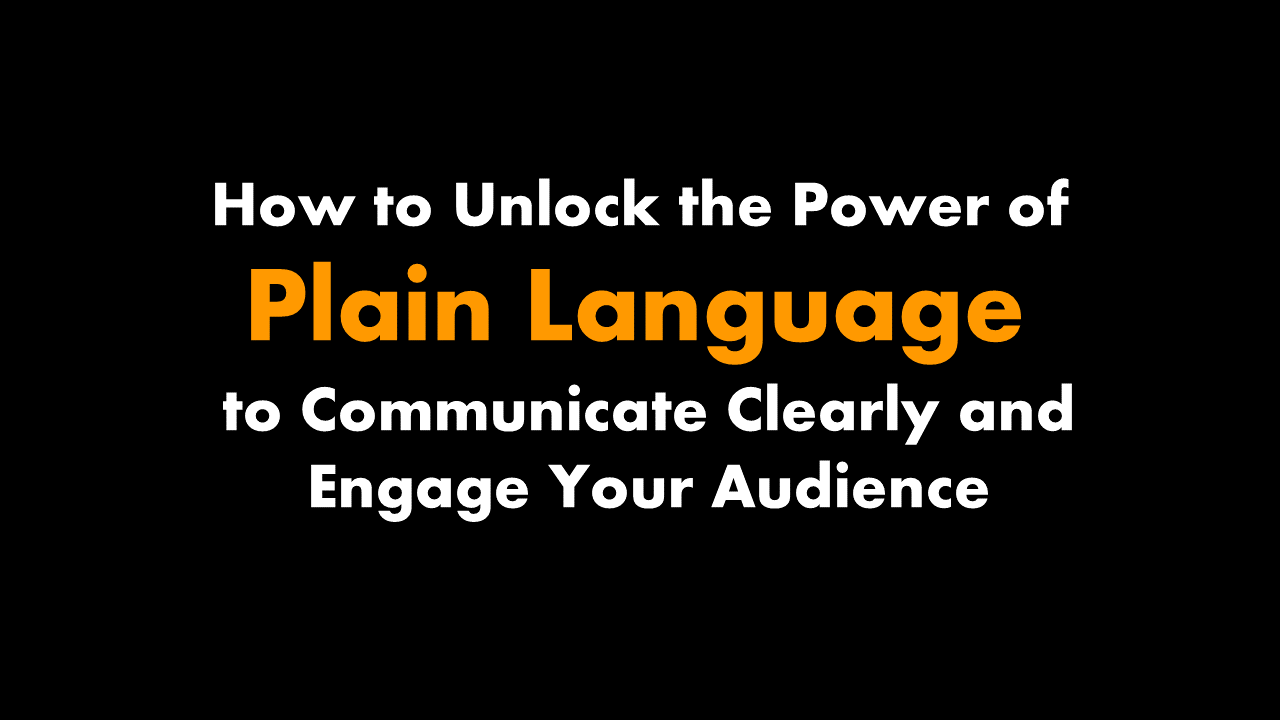Diplomacy requires clear communication, and empathy for the needs of allies and strangers alike. Jeremy Lang has spent his career cultivating that sense of connection and use of plain language communication as a diplomat, a plain language consultant, and an educator. He shares his insights on the importance of considering others' needs whenever you have information to share.
What is your role and how is it connected to plain language?
I am the lead on non-formal education in the British Council in the Wider Europe region, which spans a number of countries east of the EU. I also still teach a little English and work with a friend in running a clear language consultancy. My British Council role isn’t directly connected to plain language, but I believe that using plain language is critically important in all that I do.
What prompted your interest in plain language?
After I left a career in diplomacy I helped to set up a clear language consultancy with an old friend and colleague. My interest in plain language derives from a belief that in government and business we tend to overcomplicate much of what we write. This tendency itself derives from our ill-founded assumption that if we write using complex words and constructions, people will respect us more. However, in my experience—in fact, I think in most people’s experiences—we tend to respect and understand more those who use the minimum number of words and the simplest way to say what they mean.
How are readability and plain language related?
Inextricably. One of the checks I use after writing a first draft is to read it for fluency. This applies regardless of whether it is a simple email, or a six-page project proposal. What I mean by fluency is, does anything “catch” as I read? It could be as simple as an inappropriately used word, or a complex construction that forces you to hold something in your head for too long. If your piece of writing doesn’t read well, then it is more difficult to understand, and if it is more difficult to understand, then your reader is not engaging with the substance of your writing.
Many professions (i.e., law, medicine, finance) are gatekeepers of important information for the public. What obligations do professionals have to communicate in plain language?
There is an added imperative for professionals in any field, whether they be lawyers, doctors, or diplomats, to communicate in plain language. Precisely because they are the gatekeepers of important information for the public. In medicine the concept of “bedside manner” exists to describe the ability of doctors to communicate with their patients in ways in which they can be better understood. I believe that this concept applies in all of our professions, especially where we interact with the public. We must always consider our audience when we communicate, because if our audience doesn’t understand us, it can induce frustration, boredom, apathy, and even anger. Ultimately, we lose connection with our readers when they can’t understand us, and that has consequences for trust over time.
What’s the most important—yet simple—change professionals can make to consumer-facing documents to improve understanding?
Empathy is a key skill. I love the quote from To Kill A Mockingbird: “You never really understand a person until you consider things from his point of view – until you climb into his skin and walk around in it”. Whenever I write anything I always try to sit in my reader’s seat. To see my writing from their point of view. It’s such a simple and yet incredibly effective way of improving our writing at a stroke.
What’s the biggest danger to consumers if they don’t understand what is being communicated to them?
There are many consequences to consumers of not understanding what is being communicated to them. Of course, it depends what the topic is. If it is an official procedure, it could be that people get things wrong and suffer rejection in some application. If we misunderstand medical advice: we risk continued ill health. Or legal advice: legal jeopardy. I think often the biggest danger is that we waste so much time and effort engaging with poor writing—time that can be better spent doing other things with our lives. And time, as we all know, is money.
Beyond writing with simpler words and shorter sentences, what else can professionals do to communicate better for the public’s benefit?
Other than readability and empathy, use of the passive voice is one of my bugbears. I wince when I read it, and it’s even worse when I hear it. And it is – mostly – entirely unnecessary. When we explain how something works to someone, we will invariably begin by saying “you need to do this, or that”, not “this needs to be done”. I think there is something about using natural language in communication which is anyway easier for us, because it is the way we speak and understand each other day to day.
What’s the most convincing statistic that you can share to convince professionals to start using plain language?
There aren’t any statistics I could quote that aren’t already in the public domain. But there are many. And the statistics back up the theory, without a doubt. I think the most convincing motivation for most professionals is that when we use plain language we save time and money and build trust over time. It’s very simple. Just go and google “the benefits of plain language”.
What are a few surprising areas where plain language is valued?
In my field - diplomacy and development - the perception still exists that we love to write and read highfalutin language in beautifully complex and well-sculpted cables back to our capitals. However, in my own experience, diplomats and development experts appreciate plain language just as much as the next person—probably because they have to engage with so much bullshit day to day. Of course, I am not saying that we should over-simplify what we write. There is absolutely still room for beautiful prose. But there is real talent and value in making complex concepts understandable, not the other way round.
About Jeremy Lang
Jeremy is the British Council lead in non-formal education in the wider Europe Region. Previously, he worked as a British diplomat in London, Georgetown, Pristina, Belgrade and Havana. He also teaches a little bit of English, and helped to set up a clear writing consultancy – the Clear Writing Lab - with an old colleague and friend. You can find him on LinkedIn.
About WordRake and International Plain Language Day
Plain Language experts Cheryl Stephens and Kate Harrison Whiteside created International Plain Language Day on October 13, 2011 to celebrate the first anniversary of the signing of the Plain Language Act in the United States. Since then, plain language enthusiasts take time each year to celebrate the gains the movement has made.
In October 2022, WordRake celebrated Plain Language Day by releasing their new Simplicity editing mode to help comply with plain language laws. As firm believers in the importance of clear communication, WordRake celebrates October 13th by highlighting experts and leaders in the plain language field. To see how WordRake can help you simplify your writing, take a 7-day free trial today!






